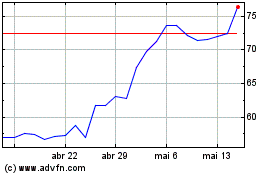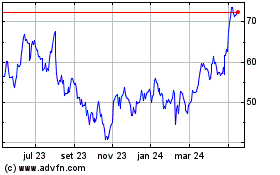Airbus Secures Canadian Wingman in Dogfight With Boeing
17 Outubro 2017 - 11:39AM
Dow Jones News
By Robert Wall
Airbus SE and Boeing Co., in their decadeslong scramble to
outsell and outbuild each other, typically slug it out at air shows
and on factory floors around the world.
On Monday, the rivalry for the $200-billion-a-year commercial
aviation market took a turn into the deal room: Airbus agreed to
take a majority stake in Bombardier Inc.'s CSeries jet project,
effectively pulling the Canadian company into the European
planemaker's corner.
The deal is the first of its kind for Airbus, which is putting
in no equity upfront for its 50.01% stake. Bombardier has agreed to
finance up to $700 million of any near-term funding needs. Airbus,
meanwhile, will take operational control and put its enormous sales
and marketing infrastructure to work selling the CSeries.
The single-aisle jet has won positive reviews from passengers
and airlines. Bombardier has struggled to sell the plane, however,
amid uncertainty over whether the Canadian firm had the financial
muscle to sustain the program. That worry is now gone.
Whether Airbus' backing alone can turn the plane into a real hit
is another question. The plane is slightly smaller than the
workhorses that have become the industry's best sellers. It's a
plane size Boeing and Airbus have both stayed away from in the
past, amid questions over demand from airlines, especially in the
U.S. They have tended to prefer either smaller regional planes
seating up to 100 passengers or larger short-haul planes carrying
150 people or more and even bigger intercontinental versions.
Airbus thinks the CSeries, that typically seats between 100 and
150 passengers, can dominate what it calls a new market for some
6,000 planes over the next two decades, said Patrick de
Castelbajac, Airbus head of strategy, in an interview Tuesday. "We
see a big growth reservoir in a market that is largely untapped,"
he said. Bombardier has so far sold just 360 CSeries planes in
almost a decade.
Investors were bullish. Shares in Toulouse, France-based Airbus
were up more than 2.5% in early afternoon European trading.
Airbus and Boeing have effectively enjoyed a duopoly in the
market for big commercial planes, ones that seat over 100
passengers, since 1997, when Boeing bought rival McDonnell
Douglas.
The Airbus-Bombardier tie-up is much more limited in nature than
that mega-deal. It nonetheless presents the biggest potential
change in the balance of power in the market in 30 years.
For decades, Boeing and Airbus have essentially engaged in
trench warfare. The rivalry has been most fierce in the narrow body
sector, the hottest market for big planes in recent years. Airbus
had won 5,202 orders through September for its workhorse in the
category -- the A320neo. It has delivered 158. Boeing has won 3,902
orders so far for its 737 Max. It has delivered about 30. The new
Airbus plane rolled out before the latest Boeing version.
The deal "significantly strengthens Airbus' hand in that
duopoly," says Nick Cunningham, aerospace analyst at investment
advisor Agency Partners.
Russia and China in May each began flight testing rival
single-aisle planes, as well, though they may not enter service for
several more years. Airbus decided to make a bid for the CSeries in
part to avoid the plane maker falling into the hands of Chinese
rivals, according to a person close to the talks. Airbus held talks
with Bombardier in 2015 about a partnership on the CSeries before
that deal unraveled.
"Clearly we are now going to have the lead in the single-aisle
segment," said Airbus' Mr. de Castelbajac. Boeing criticized the
deal Monday.
One of Bombardier's biggest CSeries deals, a 75-aircraft order
with Delta Air Lines Inc., has become a political flashpoint.
Boeing challenged the deal, and U.S. authorities have accused
Bombardier of dumping the plane on the U.S. market.
The dispute led U.S. authorities to propose a 300% tariff for
CSeries imports. The deal with Airbus envisions U.S.-bound CSeries
planes being assembled at the European plane maker's existing
aircraft production plant in Mobile, Alabama. It already makes A320
jetliners for American carriers there. Airbus and Bombardier said
the move would avoid the tariff.
The uncertainty over the U.S. deal helped spur talks between
Airbus and Bombardier, which began in August. The Airbus agreement
with Bombardier "looks like a questionable deal between two heavily
state-subsidized competitors to skirt the recent findings of the
U.S. government," Boeing said in a statement. Boeing and Airbus are
also locked in a multi-year battle at the World Trade Organization
over commercial airplane subsidies.
Write to Robert Wall at robert.wall@wsj.com
(END) Dow Jones Newswires
October 17, 2017 09:24 ET (13:24 GMT)
Copyright (c) 2017 Dow Jones & Company, Inc.
Bombardier (TSX:BBD.B)
Gráfico Histórico do Ativo
De Mar 2024 até Abr 2024

Bombardier (TSX:BBD.B)
Gráfico Histórico do Ativo
De Abr 2023 até Abr 2024
